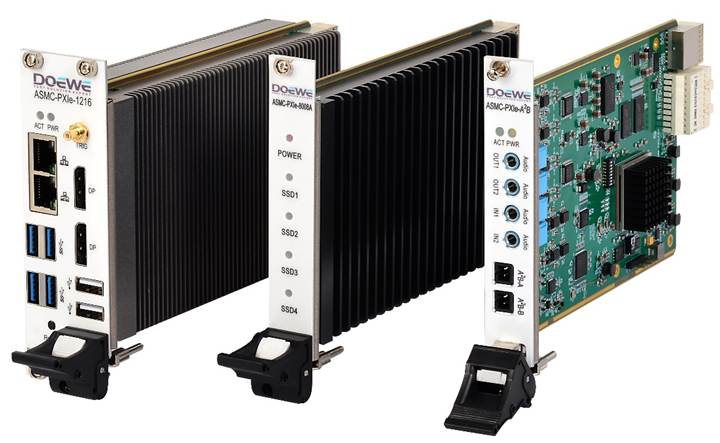With the rapid advancement of digitization and informatization, Data Acquisition Systems (DAQ) have become indispensable in industries such as industrial production, automotive electronics, aerospace, and scientific research. These systems, with their high-speed and high-precision data processing capabilities, significantly drive modern technological progress and innovation across sectors. However, as DAQ applications scale and data volumes surge, achieving efficient and rapid data storage has become a critical factor determining system performance. As a vital component, storage cards undertake real-time data storage and reliable transmission, directly impacting the efficiency and accuracy of the entire acquisition process. Selecting high-performance storage cards is essential for ensuring the efficient and stable operation of DAQ systems.

Figure 1 Side View of PXIe Storage Card
In practical DAQ system operations, storage card performance is reflected in multiple technical metrics, including storage capacity, read/write speed, latency, and stability. Among these, data storage efficiency is particularly crucial, as it directly affects the processing speed from acquisition to storage. Higher storage efficiency enhances real-time system responsiveness and ensures data integrity and reliability—especially in industrial automation and scientific research applications where minimal delays can compromise analysis accuracy or cause operational failures. Thus, achieving efficient, low-latency data storage is a key challenge in system design.
Traditional data storage methods typically require the system controller to act as a relay, transferring data from acquisition cards to storage cards. This approach not only adds transmission layers but also increases latency and potential bottlenecks. To address this, P2P (Point-to-Point) technology emerged as an innovative data transfer architecture. Leveraging high-speed switching chips, P2P technology enables direct data transfer between acquisition cards and storage cards, bypassing the controller. This design significantly shortens data paths, reduces latency and bottlenecks, and ensures efficient storage and rapid response for real-time data streams. Particularly in high-bandwidth acquisition scenarios, P2P technology stands out and has become a preferred solution for high-performance data storage.
As a professional test and measurement solution provider, Doewe Technologies launched the high-performance ASMC-PXIe-8016 PXIe Storage Card, which adopts advanced P2P technology to deliver low-latency, high-efficiency data transfer. Based on a PCIe x8 high-speed bus architecture, this card offers up to 16TB storage capacity and read/write speeds of 6.67GB/s and 6.53GB/s, meeting the demands of real-time large-scale data acquisition. In high-bandwidth, real-time-critical applications, its P2P technology ensures rapid direct data transfer, prevents data backlog in intermediate layers, and eliminates performance degradation due to latency.Additionally, the ASMC-PXIe-8016 features Doewe’s proprietary slot identification technology, enabling precise identification and management of storage modules within the chassis. This enhances data management efficiency in complex multi-module systems. The card also includes real-time energy monitoring, dynamically tracking power consumption to optimize energy management, improve system efficiency, and ensure long-term stable operation.
此外,ASMC-PXIe-8016存储卡还具备度纬科技特有的槽位识别技术,可精确标识和管理各存储模块在机箱中的位置,在多模块协同工作的复杂系统中,明显提升了数据管理的便捷性和高效性。与此同时,该产品还配备了实时能量监测功能,能够动态检测存储模块的功耗数据,帮助用户实时优化能源管理方案,提高系统整体能效,为系统长期稳定运行提供了可靠保障。

Figure 2 Side View of Doewe Technologies PXIe Storage Card
For diverse application scenarios, the storage card employs high-endurance media and robust anti-interference designs, maintaining high reliability in harsh environments (e.g., extreme temperatures, humidity, EMI, or strong vibration). Advanced internal power management and clock synchronization ensure stable power supply and precise timing control, minimizing risks during acquisition and guaranteeing system safety.
Leveraging these advantages, the ASMC-PXIe-8016 is widely used in automotive manufacturing, aerospace, semiconductor testing, defense research, and other high-end fields. Through continuous innovation and strict quality control, Doewe Technologies delivers high-performance, reliable DAQ storage solutions, earning industry-wide recognition.
In summary, P2P technology—with its direct connectivity, efficiency, and low latency—has become essential for high-efficiency data storage in DAQ systems. As a professional DAQ and storage solution provider, Doewe Technologies’ ASMC-PXIe-8016 Storage Card integrates P2P advantages with high capacity, high-speed transfer, low latency, and robustness, empowering users to tackle high-speed, high-precision acquisition demands. Moving forward, Doewe will continue innovating to deliver more efficient, stable, and secure storage solutions, driving the evolution and expansion of data acquisition technology.

Figure 3 Doewe Technologies PXIe Acquisition Card Combination
Doewe Technologies is always committed to achieving innovative, unique, and reliable product solutions in the field of data acquisition. We deeply understand that these elements are the cornerstone for enterprises to establish themselves in market competition. For this reason, we derive innovative inspiration from customers' real application needs, rather than merely showcasing flashy product features. By continuously optimizing and enhancing data acquisition solutions, Doewe Technologies empowers partners to move towards an efficient and precise future. Welcome to choose Doewe Technologies (+86-10-64327909) and together open a new chapter in data acquisition.